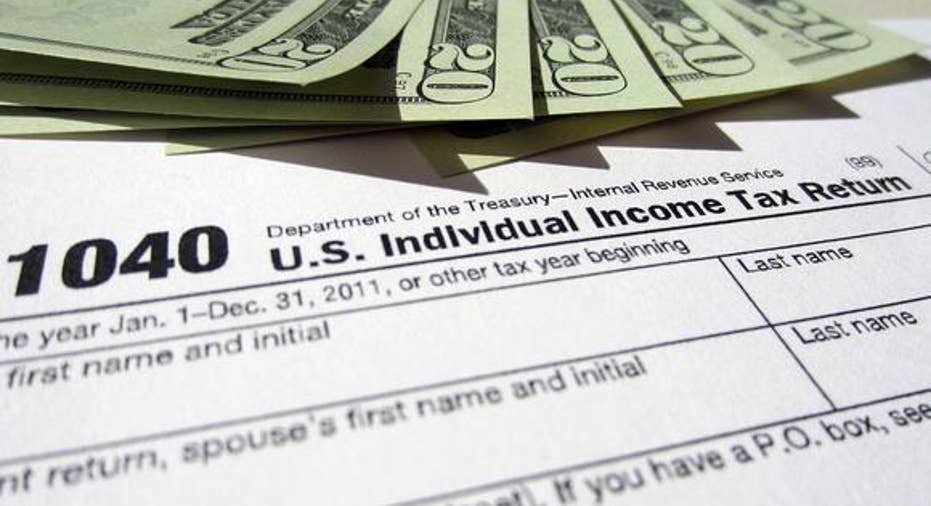7 Tax Deductions the Average American Should Remember

Photo: www.401kcalculator.org.
Taxpayers take any tax break they can find, and the most popular deductions reflect the things that as many people as possible do to reduce their tax bills. To remind you of the deductions that are most suited to average Americans, we looked at past IRS data to find those provisions that the greatest fraction of the roughly 147 million taxpayers who filed tax returns in the most recently available tax year used to reduce their taxable incomes.
1. Personal exemptionsThe most commonly used provision to reduce taxable income was the personal exemption, helping almost 137 million taxpayers, or more than 90% of all returns, save on their taxes. Nearly all taxpayers are entitled to take a personal exemption for themselves, and you can also claim dependents if you provide support to children or other eligible people. With a reduction in income of as much as $4,000 per exemption, using personal exemptions is a no-brainer for the average American.
2. The standard deductionThe next-most popular deduction was the standard deduction, which more than 100 million taxpayers used. Below, you'll find the amounts for the standard deduction for the 2015 tax returns that people are filing in early 2016.
|
Filing Status |
Standard Deduction for 2015 Tax Year |
Additional Standard Deduction if 65 or older and/or blind |
|---|---|---|
|
Single |
$6,300 |
$1,550 |
|
Married filing jointly |
$12,600 |
$1,250 |
|
Head of household |
$9,250 |
$1,550 |
|
Married filing separately |
$6,300 |
$1,250 |
Source: IRS. Note: Additional deduction is per qualifying condition for each person. For instance, joint filers where both spouses were 65 or older and blind would increase their standard deduction by $1,250 x 4 = $5,000.
Note that if you take the standard deduction, you can't claim many of the itemized deductions you'll see below. In most cases, you'll simply want to take whichever set of deductions will reduce your taxes by the largest amount.
3. State and local taxesAlmost 44 million American taxpayers claimed deductions for various state and local taxes. Under current law, you can choose to claim either state income taxes or state sales taxes as itemized deductions. In addition, real-estate taxes are deductible, and in areas that impose additional personal property taxes, those amounts are also available for an itemized deduction. Americans across the nation pay a combination of income and sales taxes, and so being able to write them off is a popular benefit.
4. Charitable giftsMore than 36 million taxpayers claimed deductions for charitable donations, which are also itemized deductions. The majority of those gifts are made in cash or by check, but in-kind gifts of items like clothing, motor vehicles, or securities also make common donations. Making sure you can document your gifts, and provide supporting materials from the receiving charity, is critical to answer any IRS concerns about your deduction.
5. Mortgage interestAlmost 33 million American homeowners claimed home mortgage interest deductions and related tax breaks. In addition to the interest portion of your regular monthly payments, upfront points that you pay when you first get your mortgage can be deductible in certain situations. Special rules have also allowed homeowners to treat mortgage insurance premiums in the same way as mortgage interest, boosting the value of this itemized deduction.
6. Tax preparation feesIf you pay money to prepare your taxes, whether you use a professional accountant or simply by tax software, then you can itemize the expense as a potential deduction. However, there's a catch: Tax-prep fees fall into a category of miscellaneous deductions, along with unreimbursed job expenses and fees on safe-deposit boxes kept for investment purposes. Miscellaneous deductions are only deductible to the extent they exceed 2% of your adjusted gross income. For many, though, those costs are large enough to leave them eligible.
7. Taxes for self-employed workers.If you work for yourself, then you'll typically owe the Social Security and Medicare taxes that employees pay, as well as the employer portion of those taxes. What many people don't realize is that half of the self-employment tax is deductible on your income taxes, and you don't have to itemize to claim it. Nearly 19 million American taxpayers took advantage of that provision, and it can lead to at least a small offset in your total tax bill to make up for the extra self-employment taxes you have to pay.
With all these deductions, there are many ways that average Americans can reduce their taxes. Make sure you take maximum advantage of each available provision to get your fair share of savings.
The article 7 Tax Deductions the Average American Should Remember originally appeared on Fool.com.
Try any of our Foolish newsletter services free for 30 days. We Fools may not all hold the same opinions, but we all believe that considering a diverse range of insights makes us better investors. The Motley Fool has a disclosure policy.
Copyright 1995 - 2016 The Motley Fool, LLC. All rights reserved. The Motley Fool has a disclosure policy.



















